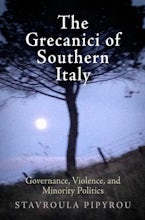The Grecanici are a Greek linguistic minority in the Calabria region of Italy, remnants of a population that has resided there since late antiquity. Their language represents a holdover from the Middle Ages, at least, and possibly even to the Greek colonies of the classical period. For decades the Grecanici passionately fought to be recognized by the Italian state as an official linguistic minority, finally achieving this goal in 1999. Violence, corruption, and mismanagement are inextricable parts of the social fabric, but Grecanici have crafted the means to invert hegemonic culture and participate in the power games of minority politics.
The Grecanici of Southern Italy provides a comprehensive ethnography that examines the ways the minority developed and sustain enduring cultural forms of solidarity and relatedness. Stavroula Pipyrou proposes the concept of "fearless governance" to describe overlapping and sometimes contradictory systems of power, authority, and relational networks that enable the Grecanici to achieve political representation at the intersection of local, national, and global encounters. Refuting easy assumptions of top-down governmental influence, Pipyrou shows how the Grecanici find political representation through the European Union and UNESCO, state policy, civic associations, family networks and illegal organizations; not being afraid to take risks, incur wrath, lose friends, or risk death in challenging the political status-quo.

